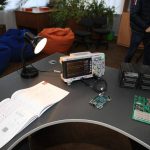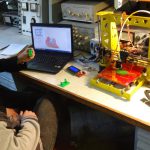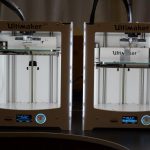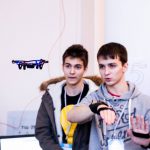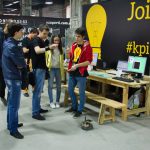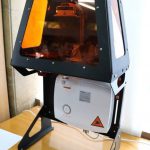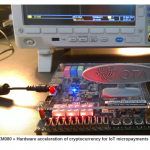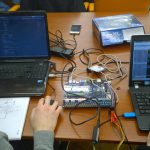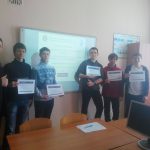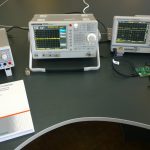DEAR ENTERPRISE!
An introductory campaign is about to begin in Ukraine, so we want to tell you about the Department of Electronic Computational Equipment Design (KEOA) of the Igor Sikorsky KPI Faculty of Electronics (KPI), on which the Lamp Electronics Laboratory is established and operates.
The KEOA Chair is located at the KPI Faculty of Electronics (FEL), and the specialty, which is carried out at the department's training of specialists, is called "Telecommunications and Radio Engineering" (code - 172). Electronics training here, in our humble opinion, is one of the best in Ukraine and Europe
We learn a lot of programming, many assemblers and embedded, a variety of processor architectures. Already in the 1st year of Arduino, later - x86, AVR, ARM, MSP430, NIOS II, MIPS, DSP Texas Instruments, STM32. Next is embedded Linux on single board computers. Two semesters of pipeline processor development (for example, MIPS) and Intel FPGA NIOS II and ARM-based crystalline systems. We launch Digital Radio (SDR) course on Ettus USRP B210 boards ((https://bit.ly/23oonVQ).
We carry out all projects and laboratory work on modern equipment, which we have a lot of. For example, we use the world's best Tektronix, Rohde & Schwarz, Keysight and Digilent equipment for measurements. All computing architectures (CPU, FPGA, DSP) have debug boards for lab work.
We are learning the full cycle of developing embedded devices, creating our own circuits, circuit diagram, circuit board, writing control programs. We have the best in Ukraine training in the development of digital chips (using the languages Verilog, System Verilog, SystemC). In senior courses, computer labs with Cisco hardware, machine learning, and computer vision (the course creator works at Google).
And here's the department's YouTube channel: https://www.youtube.com/user/kpikeoa. There you can find examples of lectures, lab work, student diploma and course projects.
The material of the department is very steep. Practically any "iron" necessary for effective and modern study of electronics is available. There are several Ultimaker 3D printers and a CNC milling machine. Here is a list of equipment in the Lampa Lab alone: https://goo.gl/ISoj8j. This lab is open daily (except Sunday) until late in the evening to allow students to carry out their own projects on the lab's equipment. In other labs more serious iron is housed: cool FPGA-based computing complexes for $ 6,000 (http://de5-net.terasic.com), many other FPGA boards (http://de0-cv.terasic.com, http: //de1-soc.terasic.com, http://de10-nano.terasic.com), Texas Instruments DSP processors for video / audio processing algorithms, CISCO switches / routers, and more.
Students often win Olympics and international hackathons (https://bit.ly/2tV5C3I), participate with their work at science and technology festivals (https://bit.ly/2lKsqzj, https://bit.ly/2KwCHNJ, https://bit.ly/2yWCFKw).
And recently, we entered the European finals of the prestigious International InnovateFPGA Contest with the IOTA cryptocurrency hardware accelerator project for the Internet of Things: https://bit.ly/2JPMWw4. We hope to get to the World Finals and present our project at Intel Headquarters in California (results will be July 15).
We practice blended learning at the department when students watch video lectures at home at a convenient time, and in the classroom discuss with the teachers incomprehensible moments, study topics of increased complexity and write test papers to test knowledge. Already in the first year, the world-famous Harvard CS50 Course (https://bit.ly/2z2d9Ua) is being used to study the basics of programming and students are awarded certificates of completion. There are video recordings of online courses from the faculty of the Department of Analog (https://bit.ly/2tSkdwP) and digital (https://bit.ly/2Ksnzlm) circuitry.
And in this video you can look at the prospects of specialty work: https://youtu.be/WWPGYqIfSJI. Almost all our graduates work in the specialty. This is either classic programming at outsourcing companies (like Software Mac Kiev, Luxoft, Ciklum, etc.), or chip development (Melexis, Samsung R&D), or device creation and programming on microcontrollers and embedded Linux (Global Logic, Sirin Software, Waves Audio, Mellanox, Ring / Amazon Labs). Our graduates work abroad as well. For example, Igor Shturma is a successful engineer at Tesla, and Leonid Cool Sky develops unmanned vehicles at the German company Visteon. By the way, many engineers are being recruited now at Visteon and Leonid can find relevant jobs on the page. Another of our graduates Rostyslav Bosenko founded his own company Aku Technologies (http://www.aku-tech.com), which develops sophisticated electronics for the USA.
The aforementioned electronic and programming companies of Ukraine annually employ many of our graduates, however, we cannot fully satisfy the growing demand for engineers. The desire to advise good professionals is now much greater than we have students. That is why companies create training centers on the basis of the department to train specialists not only from our students, but also from graduates of other departments. This training center from GlobalLogic Ukraine has been working in our department since September this year (https://bit.ly/2Jmu2cP).
It is important that because of the huge demand for specialty, we have increased the number of budget places first from 35 to 48, and then to 53 seats!
What are we writing about? It's very simple. We do not need casual people with blank eyes, but students who burn electronics and enjoy learning about it. It is much more interesting to work with such people and you can achieve great results. For our part, we are committed to making the learning process effective and fun!
So if you want to get a great electronics education and an interesting, well-paying job, feel free to contact us!
We'll be very grateful for the likes, reposts and dissemination of information to friends who want to study electronics. With good students in the near future, we will do revolutionary things!






